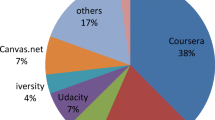Abstract
The increasing popularity of massively online open courses (MOOCs) has been attracting a lot of learners. Despite the popularity, it has been observed that there is a significant percentage of learners who discontinue courses and drop out of the platform. This is a problem that most of the MOOC courses face. The dropout probability of any student depends on his/her interaction with the platform, and the features of the course in which the student has enrolled. The research work is intended to study and analyze the dropout behavior of the students in online learning with identification of the reasons and to understand their impact. The current research accounts for the activity log of learners of 13 different online courses offered by Harvard and MIT during 2012 to 2013. The work examines the attributes which affects the student dropout rate. The research can be useful in improving the existing features of the MOOC courses and content to ensure persistence turnout of their learners.









Similar content being viewed by others
References
Allione G, Stein RM (2016) Mass attrition: an analysis of drop out from principles of microeconomics MOOC. J Econ Educ 47(2):174–186
Balakrishnan G, Coetzee D (2013) Predicting student retention in massive open online courses using hidden Markov models. Electr Eng Comput Sci Univ Calif Berkeley 53:57–58
Banerjee AV, Duflo E (2014) (Dis) organization and success in an economics MOOC. Am Econ Rev 104(5):514–518
Boyer S, Veeramachaneni K (2015) Transfer learning for predictive models in massive open online courses. In: International conference on artificial intelligence in education. Springer, Cham, pp 54–63
Cohen A, Baruth O (2017) Personality, learning, and satisfaction in fully online academic courses. Comput Hum Behav 72:1–12
Coleman CA, Seaton DT, Chuang I (2015) Probabilistic use cases: discovering behavioral patterns for predicting certification. In: Proceedings of the second (2015) ACM conference on learning@ scale, pp 141–148
Gomez-Zermeno MG, Aleman De la Garza L (2016) Research analysis on MOOC course dropout and retention rates. Turk Online J Distance Educ 17(2):3–14
Gupta S, Sabitha AS (2019) Deciphering the attributes of student retention in massive open online courses using data mining techniques. Educ Inf Technol 24(3):1973–1994
He J, Bailey J, Rubinstein BI, Zhang R (2015) Identifying at-risk students in massive open online courses. In: Twenty-ninth AAAI conference on artificial intelligence
Ho A, Reich J, Nesterko S, Seaton D, Mullaney T, Waldo J, Chuang I (2014) HarvardX and MITx: the first year of open online courses, fall 2012-summer 2013. HarvardX and MITx working paper no. 1
Jacobsen DY (2019) Drop** out or drop** in? A connectivist approach to understanding participants’ strategies in an e-learning MOOC pilot. Technol Knowl Learn 24(1):1–21
Kizilcec RF, Halawa S (2015) Attrition and achievement gaps in online learning. In: Proceedings of the second (2015) ACM conference on learning@ scale, pp 57–66
Liyanagunawardena TR, Lundqvist KØ, Williams SA (2015) Who are with us: MOOC learners on a FutureLearn course. Br J Educ Technol 46(3):557–569. https://doi.org/10.1111/bjet.12261
Onah DF, Sinclair J, Boyatt R, Foss J (2014) Massive open online courses: learner participation. In: Proceeding of the 7th international conference of education, research and innovation, pp 2348–2356
Ramesh A, Goldwasser D, Huang B, Daumé H III, Getoor L (2013) Modeling learner engagement in MOOCs using probabilistic soft logic. In: NIPS workshop on data driven education, vol 21, p 62
Rosé CP, Carlson R, Yang D, Wen M, Resnick L, Goldman P, Sherer J (2014) Social factors that contribute to attrition in MOOCs. In: Proceedings of the first ACM conference on learning@ scale conference, pp 197–198
Taylor C, Veeramachaneni K, O'Reilly UM (2014) Likely to stop? predicting stopout in massive open online courses. ar** reflection analytics for health professions education: a multi-dimensional framework to align critical concepts with data features. Comput Hum Behav. https://doi.org/10.1016/j.chb.2019.02.019
Wise AF (2018) Learning analytics: using data-informed decision-making to improve teaching and learning. In: Contemporary technologies in education: maximizing student engagement, motivation, and learning, pp 119–143. https://doi.org/10.1007/978-3-319-89680-9_7. www.scopus.com
Wise AF, Cui Y (2018) Envisioning a learning analytics for the learning sciences. In: Proceedings of international conference of the learning sciences, ICLS, vol 3, pp 1799–1806. www.scopus.com
Wise AF, Cui Y (2018) Learning communities in the crowd: characteristics of content related interactions and social relationships in MOOC discussion forums. Comput Educ 122:221–242. https://doi.org/10.1016/j.compedu.2018.03.021
Wise AF, Cui Y (2018) Unpacking the relationship between discussion forum participation and learning in MOOCs: content is key. Paper presented at the ACM international conference proceeding series, pp 330–339. https://doi.org/10.1145/3170358.3170403. www.scopus.com
Wise AF, Cui Y, ** WQ (2017) Honing in on social learning networks in MOOC forums: examining critical network definition decisions. Paper presented at the ACM international conference proceeding series, pp 383–392. https://doi.org/10.1145/3027385.3027446www.scopus.com
Wise AF, Cui Y, Vytasek J (2016) Bringing order to chaos in MOOC discussion forums with content-related thread identification. Paper presented at the ACM international conference proceeding series, 25–29-April-2016, pp 188–197. https://doi.org/10.1145/2883851.2883916. www.scopus.com
Wise AF, Schwarz BB (2017) Visions of CSCL: eight provocations for the future of the field. Int J Comput Support Collab Learn 12(4):423–467. https://doi.org/10.1007/s11412-017-9267-5
Acknowledgements
The authors are thankful to anonymous reviewers for their fruitful suggestions. Ms. Chhaya Khattri is thankful to Dr. A Sai Sabitha for her initial support and encouragement towards the start of the work.
Author information
Authors and Affiliations
Contributions
Dr. Seema Rawat conceived and designed the study, Ms. Chhaya Khattri performed the research, Dr. Deepak Kumar analyzed the data, and Dr. Praveen Kumar contributed to editorial input.
Corresponding author
Ethics declarations
Conflict of interest
The authors declare that there is no conflict of interests regarding the publication of this paper.
Additional information
Publisher's Note
Springer Nature remains neutral with regard to jurisdictional claims in published maps and institutional affiliations.
Rights and permissions
About this article
Cite this article
Rawat, S., Kumar, D., Kumar, P. et al. A systematic analysis using classification machine learning algorithms to understand why learners drop out of MOOCs. Neural Comput & Applic 33, 14823–14835 (2021). https://doi.org/10.1007/s00521-021-06122-3
Received:
Accepted:
Published:
Issue Date:
DOI: https://doi.org/10.1007/s00521-021-06122-3




